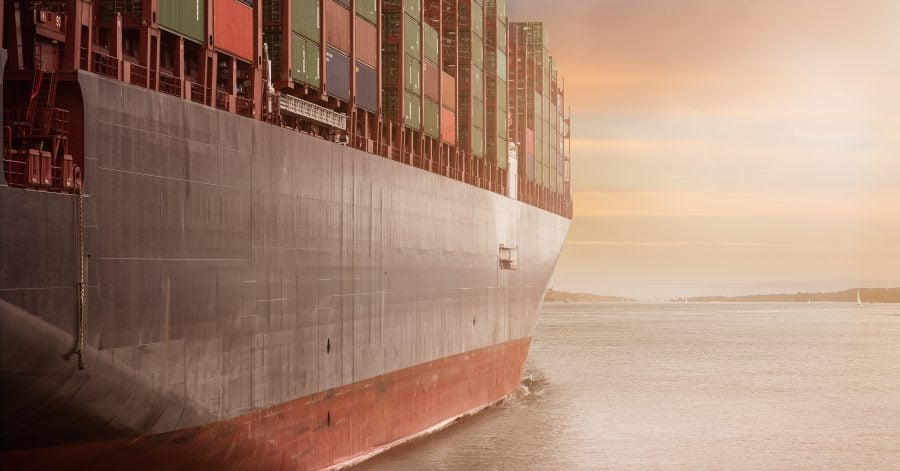When the Bulgarian company Transmetrics started out in 2013, its co-founders had a vision about redefining how the logistics sector worked. Almost a decade later, by using predictive analytics and artificial intelligence in its solutions, Transmetrics is working with some of the biggest global carriers and shipping lines in the business.
The concept behind Transmetrics was drafted in 2012 during a transport conference. At the time, one of the founders, a serial entrepreneur and current CEO Asparuh Koev, was working as a consultant for some of the largest companies in the cargo industry.
Back then, Koev identified an issue that companies at the time weren’t willing to resolve – one third of almost all containers that move globally were empty, pointing to inefficient capacity utilization. To solve this issue, Koev developed a concept version of what would later become Transmetrics itself.
“It immediately became clear that utilizing AI and machine learning technologies presented a long-needed solution for many challenges in logistics operations,” Dimitar Pavlov, head of business development at Transmetrics, tells The Recursive.
Attracting logistics experts and utilizing software implementation
Immediately after that, Transmetrics began to attract logistics experts and started with software implementation in logistics. The company also added data scientists, software architects and engineers to its team which now has more than 40 members, to create a platform dedicated to logistics.
Since its establishment in 2013, Transmetrics has raised a total of €4.8M in funding over nine rounds, with LAUNCHub Ventures being one of its most prominent investors. The company currently has an annual revenue of $2M and is working with transport and logistics companies across the full supply chain, such as DHL, DB Schenker, Kuehne Nagel, TIP Trailers, Ocean Network Express, and so on.
The Transmetrics platform now uses the latest technology and research in artificial intelligence, big data, and predictive analytics to predict and optimize resource planning and asset management.
What Transmetrics’s solutions provide companies in the industry is a way to utilize container fleets more efficiently so that more customer demand could be satisfied.
“To solve all these issues, we have developed an AI-driven Predictive Container Management solution that utilizes the vast quantities of shipping data and provides valuable insights on historical, current and expected performance. Showcasing where past inefficiencies have occurred, indicating where present such must be tackled and alerting for expected future issues across the shipping operations,” Pavlov tells The Recursive.
Transmetrics further utilizes the shipping data and adds to it external factors to forecast container demand per asset type and location and suggest the most optimal stock levels up to 16 weeks in advance.
It also suggests to companies how to conduct the most efficient storage, repositioning, and maintenance strategy for empty containers so that the container logistics costs could be reduced with double digit percentages.
Innovation is key to the future of logistics
According to Pavlov, the most valuable asset that any organization has in the 21st century is data, and it is 100% applicable to logistics, an industry that has been historically heavy with physical assets such as trucks and containers.
“To properly analyze vast data sets and drive actionable insights, ‘Business Intelligence’ turns to AI and Machine Learning technologies. For example, without these technologies, Transmetrics would not be able to drive accurate forecasts and offer optimization suggestions for its clients, since it simply would not have access to the calculating and analyzing power of AI and M.,” Pavlov explains.
Now, the next logical step for the development of these technologies is not closing them into “black boxes”, since AI can still miss the human factor or other unprecedented events when analyzing the data and produce incorrect or simply wrong conclusions that can hurt the business.
“That is why, we believe that the future of technologies in the logistics industry, apart from automation and IoT lies in a concept called Augmented Intelligence. Only by combining the domain expertise of a human and the calculating power of Artificial Intelligence, organizations can achieve the biggest benefits, because the technology needs to empower people, not replace them,” Pavlov emphasizes.
Developing the logistics sector in the Balkans
When it comes to the Balkans, the region has strong traditions in transport and logistics and due to its strategic location, and competitive conditions, there is also a tremendous potential for further development.
“If we look south, Greece is one of the largest ship owning countries in the world. The port of Piraeus is the largest Mediterranean port and the 4th largest European port. Moving a bit to the north, Bulgaria, and Romania, along with Poland have some of the largest truck and driver counts on the continent,” Pavlov adds.
According to him, there are already some strategic investments in rail and multimodal infrastructure and the EU focus on the Balkans will surely bring more funding in the coming years.
“The level of technological development of the companies from the region is not much different than their western European counterparts. Many companies already understand the value of better data collection and storage. This, bundled with the wider utilization of IoT devices will surely increase the wider adoption of AI, Big Data and Predictive Analytics,” Pavlov noted.
While the Sofia-based company will continue to develop its Balkan operations, its plans for 2022 include further expanding on the US and Asian markets.
“To facilitate that, we are investing in our internal capabilities as well as in building a network of regional partners. We have been in the industry for over 9 years now and know how important it is to have the right quality inputs to reap the benefits of AI. Thus, we are in the position to help both the early and the late adopters and fast-track their digitization efforts,” Pavlov concluded.








